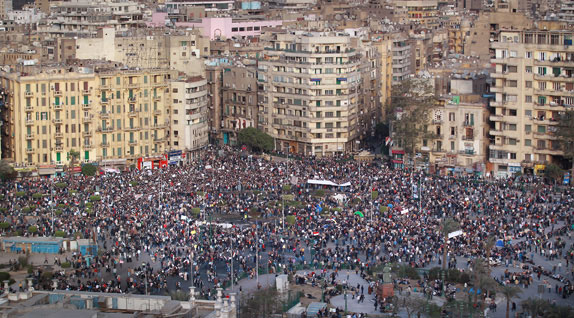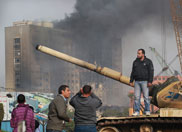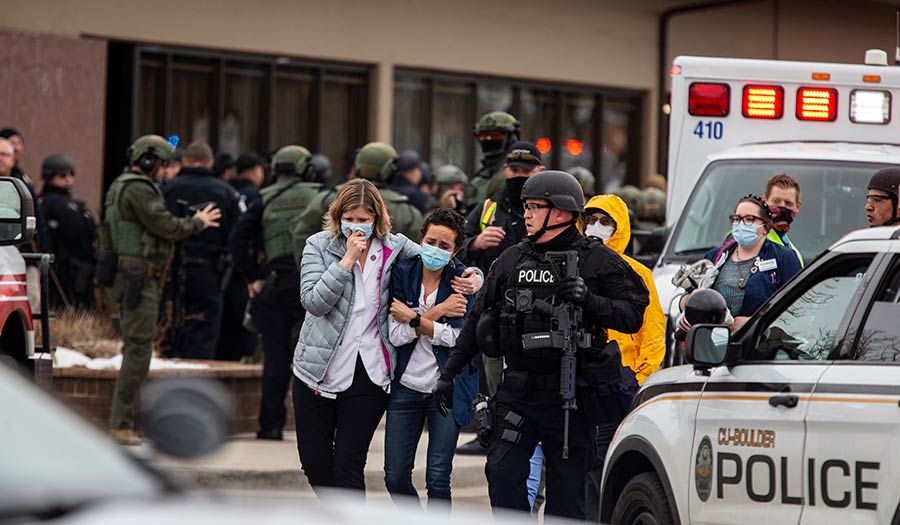 Peter Macdiarmid/Getty Images
Peter Macdiarmid/Getty Images
Article
Learn the why behind the headlines.
Subscribe to the Real Truth for FREE news and analysis.
Subscribe NowA high-ranking White House official once said, “Rule one: Never allow a crisis to go to waste.” While he was referring to missing an opportunity to take political action, Egypt’s crisis should be instructive to citizens and leaders in the United States.
Egypt has been engulfed in a crisis of massive proportions, with upward of 2 million protesters rising up across the nation, looting and clashing with authorities.
“Egyptians poured into downtown Cairo demanding President Hosni Mubarak’s resignation as the turmoil triggered by the fall of Tunisia’s government threatened to end his 30-year reign over the region’s most-populous nation,” Bloomberg reported.
“The unrest has left about 300 dead, according to a preliminary United Nations toll, and roiled international stock, bond and oil markets, with investors concerned they may spread to nearby countries or lead to the closure of the Suez Canal.”
Looking past the violence and politicking reveals there is much to be gained—if one is willing to grasp the lessons from these events, and not allow them to “go to waste.”
(1) Riots are contagious: In Tunisia, a man set himself ablaze, sparking riots that led to removal of the nation’s government. The Tunisian riots inspired the masses in Egypt to protest, riot, call for million-man marches, and resist government-ordered curfews.
Defiant actions such as these are driven by the intoxicating desire for power, which spurs normally docile people to attempt to right wrongs by any means necessary—even violence.
In Egypt, organized vigilante groups have had to fill the void of missing police patrols and business owners have had to guard their businesses overnight from potential looters.
 Peter Macdiarmid/Getty Images
Peter Macdiarmid/Getty Images
Regardless of sincere intentions for positive change, riots have a way of getting out of control and leading people to do things they will later regret—usually when it is too late, and damage has been done.
The God of the Bible understands riots appeal to human nature. This is why He ordered His people, “You shall not follow a multitude to do evil; neither shall you speak in a cause to decline after many to wrest judgment” (Ex. 23:2).
No riots, no impromptu lynch mobs. Justice must be rendered with a calm state of mind, with a peaceful spirit.
Riots, by their nature, reveal man’s raw character. And it is ugly. For instance, vandals ransacked Cairo’s Egyptian Museum, ripping off the heads of two mummies, smashing showcases and damaging artifacts. Already 300 people have died in clashes with police, and more than 3,000 have been injured.
(2) America is running out of “lovers”: That is, foreign governments friendly to U.S. interests overseas. Washington seemingly no longer values the special relationship it has long nurtured and enjoyed with Britain and Israel. Instead, its focus has shifted to wooing governments with questionable track records.
Now, Washington fears that Egypt will go the way of Iran, and become another anti-U.S. theocracy. This could mean losing access to the Suez Canal, a major artery for shipping oil to other nations.
While Mr. Mubarak promised to not run for re-election next fall, “blood” has already been drawn. It remains to be seen if this move will diminish mounting pressure from protesters.
Countries among the international community have tacitly expressed their support to him, while carefully striving to not be seen by the Egyptian public as explicitly endorsing his office. No one wants to bear the wrath of a replacement government—particularly one guided by anti-West philosophies, such as the Muslim Brotherhood, a transnational and political opposition group.
Will America, in times of need (such as a disaster exceeding the scale of a Hurricane Katrina), one day find itself cut off from the affections of former “lovers” (Ezek. 16:37)?
(3) It could happen in the U.S.: While Egyptians have taken to the streets to protest social injustices, their discontent is also due to their deteriorating standard of living. Unemployment is high. Many with jobs subsist on just a few dollars a day. Foodstuffs are scarce.
 Chris Hondros/Getty Images
Chris Hondros/Getty ImagesDesperate times inspire people to do desperate things. For years, America has enjoyed an unprecedented standard of living. Even those who make minimum wage live far better than people in most parts of the world.
But America’s age of prosperity is winding down, with the federal deficit time bomb ticking in the background, waiting to explode.
The U.S. dollar is currently the world’s reserve currency—but not for much longer. China understands this. So do other nations, which are already preparing for this to change.
When it happens, America’s standard of living will change overnight—out of control gas prices, food shortages, hyperinflation, mass joblessness. The lifestyles to which Americans have grown accustomed—have taken for granted—will disappear for the mass majority. As in Egypt, restlessness and discontent will give way to anger, fear, frustration and hopelessness.
Unless America takes drastic and necessary actions to solve its debt problems, the future looks bleak.
(4) Leaders must lead—regardless of the risk: U.S. politicians on both the right and left waver over taking charge and making drastic, but necessary, budget cuts to avoid the same crisis as Egypt. Each side is afraid of taking the lead, fearing that the other will stir up public sympathy and score political points.
But leaders—true leaders—make hard calls and put the needs of their constituents above any personal desires to stay in office come next election. They know it is painful to make budget cuts and deny one’s own wants.
Many resort to the easy route of blaming elected leaders when the public essentially says, “Let’s cut everything—except for [insert favorite entitlement here]!” Gone are the days of World War II, when the government could call on citizens to make sacrifices—and the people accepted it as their patriotic duty to follow through.
Certainly, the riots in Egypt bring lessons. But who will learn?
To better understand the true nature of riots—despite whatever sincere intentions are said to be behind them—read “Making Sense of an Earth Filled with Violence.”
- Real Truth Magazine Articles
- SOCIETY & LIFESTYLES
 Making Sense of an Earth Filled with Violence
Making Sense of an Earth Filled with Violence
Other Related Items:
More on Related Topics:
- In a Nigerian Village, Extremists Issued a Call to Prayer and Then Slaughtered Those Who Turned Up
- Sudanese Paramilitary Force Abducting Children in Darfur, Witnesses Say
- Nigeria’s Northeast Faces Worst Hunger in a Decade as Aid Cuts Hit Region, UN Says
- Uganda Shuts Down Internet Ahead of Election, Orders Rights Groups to Halt Work


